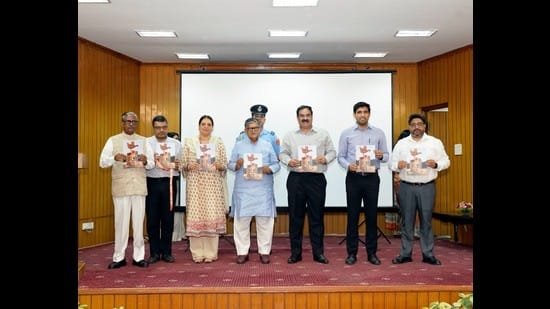Chandigarh, April 30 — After a seven-year delay, the Union Territory administration officially launched the Chandigarh Startup Policy 2025, offering a range of financial incentives and institutional support aimed at fostering a vibrant entrepreneurial ecosystem in the city.
The long-awaited policy, first conceptualized in 2018, was unveiled by Punjab Governor and UT Administrator Gulab Chand Kataria at a formal event held at the Punjab Raj Bhawan. “Our youth are talented, tech-driven and just need the right support,” Kataria said. “This startup policy will provide them with a positive and innovative path, create jobs, and contribute to making the region drug-free.”
The event was attended by key officials including Chief Secretary Rajeev Verma, Mayor Harpreet Kaur Babla, Deputy Commissioner Nishant Yadav, and Principal Secretary to the Punjab Governor Vivek Pratap Singh. Representatives from leading academic and research institutions such as Panjab University, PGIMER, IISER Mohali, IIT Ropar, and NABI also participated, alongside founders of startups, budding entrepreneurs, and members of prominent industry associations like CII, TiE, PHDCCI, ASSOCHAM, CAN, Punjab Angels Network, and Innovation Mission Punjab.
According to the UT administration, the Chandigarh Startup Policy 2025 will offer support at various stages of a startup’s journey—from idea validation to seed funding. While details on specific grant amounts are yet to be disclosed, the policy outlines structured financial aid, mentorship opportunities, and institutional collaboration to build a startup-friendly ecosystem in the city.
Kataria said the policy reflects the vision set forth by Prime Minister Narendra Modi, who launched the national Startup India initiative in 2016 and encouraged states and Union Territories to create region-specific startup policies. “Just like Bengaluru, Pune, or Ahmedabad, our City Beautiful too can emerge as a prominent startup destination,” Kataria said.
The drafting of the Chandigarh policy began in 2018 but encountered repeated delays. Most recently, a planned launch in October 2023 was postponed after the UT finance department raised queries about the policy framework, causing further hold-ups.
As per the final guidelines, a startup will no longer qualify for benefits once it completes 10 years or crosses an annual turnover of ₹100 crore. Any complaints involving fraud or misrepresentation will be reviewed by a high-power committee appointed by the administration.
Despite its delayed rollout, officials and stakeholders alike expressed optimism about the policy’s potential to unlock new economic opportunities and position Chandigarh as a regional innovation hub.

